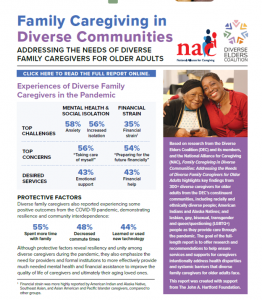Based on research from the Diverse Elders Coalition (DEC) and its members, and the National Alliance for Caregiving (NAC), Family Caregiving in Diverse Communities:  Addressing the Needs of Diverse Family Caregivers for Older Adults highlights key findings from 300+ diverse caregivers for older adults from the DEC’s constituent communities, including racially and ethnically diverse people; American Indians and Alaska Natives; and lesbian, gay, bisexual, transgender and queer/questioning (LGBTQ+) people as they provide care through the pandemic. The goal of the full-length report is to offer research and recommendations to help ensure services and supports for caregivers intentionally address health disparities and systemic barriers that diverse family caregivers for older adults face.
Addressing the Needs of Diverse Family Caregivers for Older Adults highlights key findings from 300+ diverse caregivers for older adults from the DEC’s constituent communities, including racially and ethnically diverse people; American Indians and Alaska Natives; and lesbian, gay, bisexual, transgender and queer/questioning (LGBTQ+) people as they provide care through the pandemic. The goal of the full-length report is to offer research and recommendations to help ensure services and supports for caregivers intentionally address health disparities and systemic barriers that diverse family caregivers for older adults face.
This report was created with support from The John A. Hartford Foundation.
Some report themes include:
• Designing research that purposefully establishes objectives related to a better understanding of caregivers from diverse backgrounds and is inclusive, transparent, and representative of all communities.
• Acknowledging, incorporating, and continually improving cultural literacy into the development of programs, resources, and services designed for caregivers of diverse racial, ethnic, political, and cultural backgrounds, or with tribal affiliations.
• Ensuring that the eligibility criteria for programs and services designed for caregivers offer an inclusive definition of “family” to include siblings, aunts, uncles, cousins, nieces, nephews, grandparents, grandchildren, domestic partners, youth, members of the same tribe, friends, and/or community members that are not related by blood, but whose close association with the care recipient is the equivalent of a family relationship.
• Recognizing and increasing access to caregiver programs, resources, services, and support networks that are designed to go beyond traditional notions of the family structure and are inclusive of and welcoming towards racially and ethnically diverse communities, American Indian and Alaska Natives, and the LGBTQ+ communities.
• Facilitating better access to programs, services, and resources to caregivers in rural areas and where access to technology is less readily available. Likewise, recognizing that a lack of technological literacy in rural, urban, and suburban areas alike may present a challenge for caregivers accessing formal supports.
